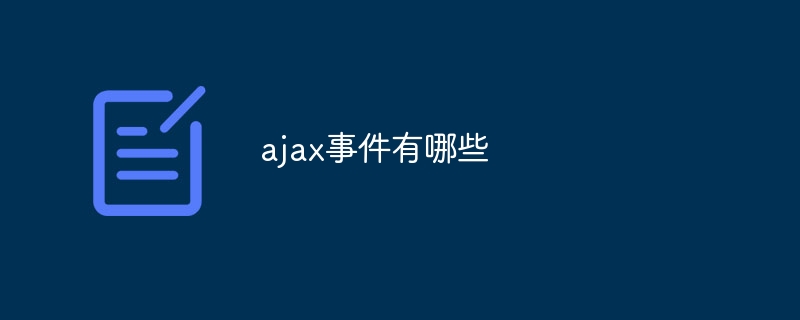Home >Web Front-end >Front-end Q&A >What are ajax events?
What are ajax events?
- 百草Original
- 2023-11-17 13:59:461391browse
ajax events include readyStateChange, success, error, complete, timeout, beforeSend and completeSend, etc. Detailed introduction: 1. The readyStateChange event is the most important event in the AJAX request. It is triggered when the readyState attribute value of the Ajax request changes; 2. The success event is an event triggered when the AJAX request is successfully completed, etc.

The operating system for this tutorial: Windows 10 system, DELL G3 computer.
AJAX (Asynchronous JavaScript and XML) is a web development technology that uses multiple technologies. It allows web pages to exchange data with the server and update part of the web page content without reloading the entire page. In AJAX, events refer to some operations or behaviors that occur in the client browser, such as the user clicking a button, submitting a form, hovering the mouse, etc. These events can be captured and processed through AJAX technology to achieve asynchronous updates and interactions with the page. The following are some common AJAX events:
1. readyStateChange event
The readyStateChange event is the most important event in AJAX requests. It is triggered when the readyState attribute value of the Ajax request changes. The value of the readyState attribute indicates the status of the request, which can be set to 0 (uninitialized), 1 (open connection), 2 (receive data), 3 (data interaction), 4 (complete). When the value of the readyState attribute is 4, it means that the request is successfully completed. At this time, the data returned by the server can be obtained and processed.
2. Success event
The success event is an event triggered when the AJAX request is successfully completed. It can be triggered after the data returned by the request is successfully parsed and processed, and used to perform some successful operations or behaviors.
3. Error event
The error event is an event triggered when an error occurs in an AJAX request. It can be used to handle request failure situations, such as network errors, server errors, etc.
4. Complete event
The complete event is an event triggered when the AJAX request is completed. It can be triggered after the request succeeds or fails and is used to perform some summary operations or behaviors. For example, you can clear the loading indicator or display an error message in the complete event.
5. Timeout event
The timeout event is an event triggered when the AJAX request times out. It can be used to handle request timeouts, such as when a request does not return a result within the specified time.
6. beforeSend event
The beforeSend event is an event triggered before the AJAX request is sent. It can be used to perform some preparation work before sending a request, such as setting request headers, setting the response format of the request, etc.
7. completeSend event
The completeSend event is an event triggered when the AJAX request is sent. It can be used to perform some finishing work after the request is sent, such as clearing the loading indicator or displaying a prompt message.
In addition to the common AJAX events mentioned above, there are some other events that can be used to handle specific operations or behaviors, such as formSubmit events, click events, mouseover events, etc. These events can be used in conjunction with AJAX technology to achieve richer and more dynamic page interaction effects. It should be noted that different browsers and frameworks may make some adjustments and optimizations to the names and usage of events, so specific implementations need to be adjusted and processed according to specific circumstances.
The above is the detailed content of What are ajax events?. For more information, please follow other related articles on the PHP Chinese website!

